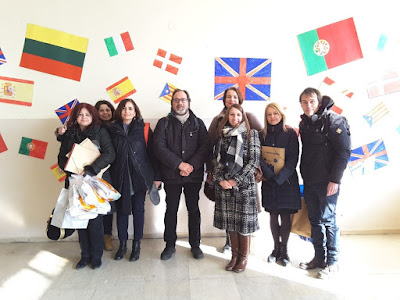19 teachers from 6 project partner countries this time gathered in 3o Gymnasio Edessa, Greece, for the 5th international Metaminds project meeting and the 4th joint staff training event, on 23rd - 28th January, 2017.
On the arrival, the visiting teachers received a warm welcome from the Greek pupils who performed their traditional dances, including syrtaki, of course! Then, they showed us their school facilities and told about school life.
The meeting started with the introduction of the teachers' pilot course on metacognition by Monica Melloni, the general coordinator of the project. Later, all the participants had a Skype conference with Claudia Sabatano, the headmistress of ICS "Giorgio Perlasca" (Rome, Italy), who also gave a lecture about emotions in learning to develop and enrich metacognitive strategies of the teachers, taking part in the Metaminds pilot course.
Throughout the week, the visiting teachers had an excellent opportunity to do a few job shadowing activities, while the committee (coordinators) thoroughly followed their own schedule, devoting all the time to working on the present and future activities of teachers and pupils.
On Thursday and Friday, the meeting participants had a great honour to meet and enjoy the seminars, given by the expert on metacognition, Anastasia Efklides from Aristotle University of Thessaloniki. Not only did the professor give her valuable advice on the teachers and pupils' training courses being developed by our project teams, but she also took part in the public event for the school community.
The
Project Dissemination Event took place on 26 January. It was attended by a huge
number of 3o Gymnasio teachers, pupils and
their parents as well as Edessa municipality members. As usual, Metaminds
project teams introduced their schools, towns, countries and shared the joy of
the joint work of seven schools from across Europe under the Erasmus Plus
banner. After the official speeches and presentations, the hosts gave an
unforgettable performance of Action Painting and the school choir sang songs
from Greek films.
Speaking about the cultural experience, it is impossible not to mention Greek cuisine. During the visit, we have tried a lot of wonderful dishes representing Macedonian Cuisine as the town of Edessa, known as "city of waters", is in northern Greece. The waterfalls of Edessa are the largest waterfalls in the Balkans. The power of water is really breathtaking! To be completely amazed by the miracles of Greek nature, we had an exceptional chance to enjoy Loutraki-Pozar thermal water springs, the healing properties of which have been known since historic times.
Finally,
we explored Thessaloniki, the second largest city in
Greece, a port on the Thermaic Gulf of the Aegean Sea. The emblem of this
beautiful waterfront city is the White Tower, a 15th century
fortification, which is contemporary used as the exhibition space of the
Byzantine Museum of Thessaloniki.
The meeting in Edessa has ended, but not the project. We have bid farewell to fantastic Greece and said many thanks to our Greek partners Eyanθια Σοφια and Eleni Kalaitzi, knowing that we will meet again. This time in Lithuania.















Acting without excuses (prof. Maite Alarcón Iglesias)
ReplyDeleteIt was very cold outside. The first day in the school, after the warm welcome, foreign teachers went to the current classes (job shadowing). We were all covered by our scarf and coats, and we stayed all together very close. The coldest week of the current year, everybody had been saying everywhere that it was as if the gods were angry and punishing them for something.
A freezing week... Good to talk about war. War related to peace. Always the pairs: our history is understandable by something and its opposite. Some and none. Good and bad. Can we love without hating before? In any case, students in Edessa had the chance to experience this big and important concepts, Peace and War, being conducted by a special teacher, Angelina. And we were lucky to witness it, during one hour.
No tables, no pupils’ chairs in the classroom. Only a row for us, “the supervisors”. Music and students are moving around the room. They change their rhythm and do different positions. They are connected to the space, they smiled. Sometimes they stop, then keep going.
—It’s a class of what? —I ask one of the students who helped the visiting teachers.
—Art. They’re doing a kind of performance theatre about War and Peace
I would have liked to insist —teachers always need to have things clear!— but I decided to enjoy it and find out the answer by myself. Not often have I the chance to be impressed in a classroom.
Students are happy to take part the performance. They walk quickly, slowly, squat, bend down... Once, they play to the mirror only with the background music and Angelina‘s soft voice. They look at each others’ eyes, they walk by holding hands, some squeezed them and sometimes they don’t look each other at all. The teacher gives some instructions and the volume of the music is changing. They seem to be pleased even if this is the first time they are doing it.
The class is divided in several small groups, then they get out a picture and each group represents a part of the photo. Warlike pictures. They all stand still, silent, quiet, rigid and Angelina gets closer to ask them what are they doing and how are they feeling in their role. She takes theirs students’ shoulders and speaks languidly one by one. They answer shortly without moving. Silence is very powerful.
The horror of the war. Victims and executioners. No need for more words.
After a while, they made a huddle and talked about what has happened.
—Are they talking as students or as characters? —I can’t avoid asking to the assistant student.
—Is the same, Madame —I was astonished about the depth of her answer.
I feel this class was ingenious, quite plain at the same time, and perfect to get cold off our bodies and feel the warm in our hearts.